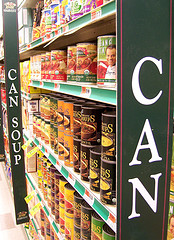
Yesterday, Consumer Reports released a study of the levels of bisphenol a (BPA) in food products. They found that nearly all of the 19 canned food products they tested contained levels of BPA which have been associated with harm in laboratory animal studies. These included name-brand products like DelMonte green beans and Progresso vegetable soup, which had some of the highest levels measured. Other popular brands like Chef Boyardee, Campbell's, Green Giant, and Hormel also contained concerning levels BPA. Even more alarming, organic canned food and other brands labeled as "bpa-free" had detectable levels of BPA, including Annie's Organic and Eden Foods. None of the contaminated foods list BPA in their ingredients list because it isn't intentionally added to the food but rather leaches from the lining of the can into the food.
Because this was a small study, this study is just a snapshot of what people eating canned food might be exposed to, but we can assume that, in general, most canned food contains some level of BPA. The bad news is that you can't know for sure which canned foods are most contaminated.
The good news is that it is possible to eat your vegetables and have them be BPA-free. Tests of frozen food or food packaged in box or pouch contained much lower or non-detectable levels of BPA. Curiously, Hunt's canned tomato sauce contained low BPA levels - similar to those found in frozen food - which suggests it is possible to can food with little to no BPA contamination.
Why am I concerned about BPA? BPA is a hormone disrupting chemical that acts like the female sex hormone, estrogen, and can interfere with normal development and function of the body. In animal studies, developmental BPA exposure has been linked to prostate cancer, breast cancer, pre-diabetes (insulin resistance), changes in fat metabolism, and changes in the way the brain develops resulting in behavioral abnormalities. Emerging human research has found similar evidence of harm. And all of us are exposed; over 90% of Americans tested by the CDC were found to have residues of BPA in their bodies.
The Consumer Reports study rightly points out that BPA exposure from eating canned food represents a risk to human health. Their study has been disputed by the chemical industry who cling to the results of flawed studies they funded.
The FDA relied on these same industry studies when concluding that current levels of BPA exposure are safe. However, the FDA is currently re-evaluating the safety of BPA after their own scientific advisors sharply criticized them for doing an "inadequate" analysis. FDA is expected to announce an updated of this process at the end of this month and in December the EPA is expected to announce their "action plan" for evaluating the toxicity of BPA.
While it is great that many companies and retailers are voluntarily replacing their use of BPA in consumer products like baby bottles, sippy cups and maybe even some food packaging, we should not assume that just because a product is "BPA-free" means that it is safe.
Often we have little to no information about the replacement chemicals being used and the current law intended to protect us from toxic chemicals is so weak and broken, there is no functional system in place to protect us from toxic chemicals! Fortunately, there is a momentum building to reform this broken law and put in place a new law that will prevent us from having to worry about whether the replacements are really safer.
In the meantime, NRDC recommends that everyone, especially pregnant women and young children, reduce their exposure to BPA as much as possible.
We have more information BPA and recommendations for avoiding exposure on our website. These include:
- Limit your consumption of canned food by eating fresh or frozen produce and buying processed food in "brick" cartons, pouches or glass.
- Limit your consumption of canned soda and beer - where possible choose glass as an alternative.
- If you have a newborn, avoid baby bottles or sippy cups made of polycarbonate (hard, clear, shatterproof) plastic. They are marked with the recycling symbol #7, and sometimes labeled "PC." (Not all #7 plastics are polycarbonates-the only way to know for sure is to call the manufacturer.)
- Use a BPA-free reusable water bottle, such as an unlined stainless steel bottle.
- Don't allow your children to have dental sealants made from BPA (or BADGE) applied to their teeth, and don't have these sealants applied to your teeth while you are pregnant. Ask your dentist to provide BPA-free treatments.
* * * This post originally appeared on NRDC's Switchboard.
Sarah Janssen is a staff scientist at The Natural Resources Defense Council in San Francisco. She holds a master’s degree and PhD in reproductive biology from the University of Illinois and a master’s degree in public health. NRDC is a non-profit organization dedicated to protecting the environment, people and animals. NRDC was founded in 1970 and is comprised of more than 300 lawyers, scientists and policy experts, with more than one million members and e-activists.

